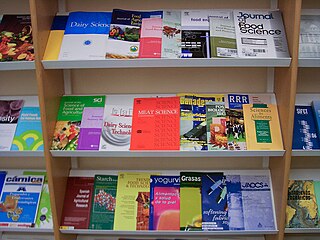
Animal husbandry is the branch of agriculture concerned with animals that are raised for meat, fibre, milk, or other products. It includes day-to-day care, selective breeding, and the raising of livestock. Husbandry has a long history, starting with the Neolithic Revolution when animals were first domesticated, from around 13,000 BC onwards, predating farming of the first crops. By the time of early civilisations such as ancient Egypt, cattle, sheep, goats, and pigs were being raised on farms.

An academic journal or scholarly journal is a periodical publication in which scholarship relating to a particular academic discipline is published. Academic journals serve as permanent and transparent forums for the presentation, scrutiny, and discussion of research. They nearly universally require peer review or other scrutiny from contemporaries competent and established in their respective fields. Content typically takes the form of articles presenting original research, review articles, or book reviews. The purpose of an academic journal, according to Henry Oldenburg, is to give researchers a venue to "impart their knowledge to one another, and contribute what they can to the Grand design of improving natural knowledge, and perfecting all Philosophical Arts, and Sciences."
Biodynamic agriculture is a form of alternative agriculture based on pseudo-scientific and esoteric concepts initially developed in 1924 by Rudolf Steiner (1861–1925). It was the first of the organic farming movements. It treats soil fertility, plant growth, and livestock care as ecologically interrelated tasks, emphasizing spiritual and mystical perspectives.

Bovine somatotropin or bovine somatotrophin, or bovine growth hormone (BGH), is a peptide hormone produced by cows' pituitary glands.

Environmental vegetarianism is the practice of vegetarianism when motivated by the desire to create a sustainable diet that avoids the negative environmental impact of meat production. Livestock as a whole is estimated to be responsible for around 15% of global greenhouse gas emissions. As a result, significant reduction in meat consumption has been advocated by, among others, the Intergovernmental Panel on Climate Change in their 2019 special report and as part of the 2017 World Scientists' Warning to Humanity.

Developmental Biology is a peer-reviewed scientific journal. It was established in 1959 and is the official journal of the Society for Developmental Biology. It publishes research on the mechanisms of development, differentiation, and growth in animals and plants at the molecular, cellular, and genetic levels. The journal is published twice a month by Elsevier.

Behavioral and Brain Sciences is a bimonthly peer-reviewed scientific journal of Open Peer Commentary established in 1978 by Stevan Harnad and published by Cambridge University Press. It is modeled on the journal Current Anthropology.

Patrick O'Reilly Brown is an American scientist and businessman who is the founder of Impossible Foods Inc. and professor emeritus in the department of biochemistry at Stanford University. Brown is co-founder of the Public Library of Science, inventor of the DNA microarray, and a former investigator at Howard Hughes Medical Institute.

Motilal Madan is an Indian biotechnology researcher, veterinarian, academic and administrator. In a career spanning over 35 years, Madan published 432 research articles and policy papers in international and national reference journals—including 226 original research papers—and pioneered research in reproductive endocrinology, embryo biotechnology, In vitro fertilisation, and cloning.

Virology is a peer-reviewed scientific journal in virology. Established in 1955 by George Hirst, Lindsay Black and Salvador Luria, it is the earliest English-only journal to specialize in the field. The journal covers basic research into viruses affecting animals, plants, bacteria and fungi, including their molecular biology, structure, assembly, pathogenesis, immunity, interactions with the host cell, evolution and ecology. Molecular aspects of control and prevention are also covered, as well as viral vectors and gene therapy, but clinical virology is excluded. As of 2013, the journal is published fortnightly by Elsevier.

Livestock's Long Shadow: Environmental Issues and Options is a United Nations report, released by the Food and Agriculture Organization (FAO) of the United Nations on 29 November 2006, that "aims to assess the full impact of the livestock sector on environmental problems, along with potential technical and policy approaches to mitigation". It stated that livestock accounts for 18% of anthropogenic greenhouse gas emissions, a figure which FAO changed to 14.5% in its 2013 study Tackling climate change through livestock.

A low-carbon diet refers to making lifestyle choices related to food consumption to reduce resulting greenhouse gas emissions (GHGe). Choosing a low carbon diet is one facet of developing sustainable diets which increase the long-term sustainability of humanity.

Experimental Physiology is a monthly peer-reviewed scientific journal published by Wiley-Blackwell on behalf of The Physiological Society. According to the Journal Citation Reports, its 2020 impact factor is 2.969 It covers all areas of physiology, especially work that deals with both physiological and pathophysiological questions that investigate gene/protein function using molecular, cellular, and whole-animal approaches. All articles become freely accessible 12 months after publication. The editor-in-chief is Damian Bailey.
British Society of Animal Science (BSAS) is a learned society in the field of animal science, established in 1944 as the British Society of Animal Production.
Animal Production Science is an international peer-reviewed scientific journal for agriculture and animal science and published by CSIRO Publishing. Research articles in the journal focus on improving livestock and food production, and on the social and economic issues that influence primary producers. It is predominantly concerned with domesticated animals ; however, contributions on horses and wild animals are also published where relevant.

Cattle are large, domesticated, cloven-hooved herbivores. They are a prominent modern member of the subfamily Bovinae and the most widespread species of the genus Bos. Adult females are referred to as cows and adult males are referred to as bulls.
Professor Jennie Elizabeth Pryce is a quantitative geneticist based in Melbourne, Australia. Jennie is the DairyBio animal program leader in conjunction with her role as principal research scientist for Agriculture Victoria and Professor of animal genetics at La Trobe University.

Muhammad Subhan Qureshi is a biologist from Khyber Pakhtunkhwa, Pakistan, who is the founder and chief patron of Dairy Science Park. He also worked as a dean at the University of Agriculture, Peshawar, Pakistan, and as adjunct professor at Charles Sturt University, Wagga Wagga, Australia.

Alison L. Van Eenennaam is a Cooperative Extension Specialist in the Department of Animal Science at the University of California, Davis and runs the Animal Genomics and Biotechnology Laboratory. She has served on national committees such as the USDA National Advisory Committee on Biotechnology in the 21st Century (AC21) and was awarded the 2014 Borlaug CAST Communication Award. Van Eenennaam writes the Biobeef Blog.

The Plant Journal is a peer-reviewed scientific journal of plant science published by Wiley-Blackwell for the Society for Experimental Biology. It was established in 1991 and is currently edited by Lee Sweetlove. The journal is published twice per month.















